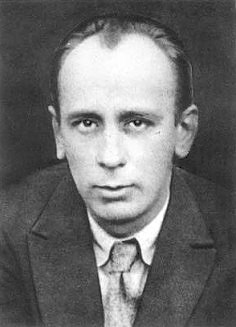dialogism (Mikhail Bakhtin)

対話主義
dialogism (Mikhail Bakhtin)

解説:池田光穂
「バフチーンは他者性をすべての生の基盤 と捉え、対話を、すでに存在しているものといまだ存在していないものとの絶えざる交換をあらわす、個々 の存在の基本構造と捉えた。そうした変形を調整し成形するのは人間の意識である。意識は、「私」活動と「私の中の私でないもの」すべてとの絶えざる交換を 調整する。したがって、自己/他者という区別は根源的対立であり、他のすべての対立はそこから派生してくる。行為の現実世界のもっとも高度な構造原理は、 私と他者との具体的な構造体系的・認識論的対立なのである」(クラークとホルクイスト 1990:91)
ミハイル・バフチン(1895-1975)の主体概念は、このように完 結した自己=個人の範疇に閉じるものではなく、自分と相容れないものとの並存において現れてくるものである。そのような並存をコミュニケーション(交通)するものが、「対話」である。
複数の対話が並存している状態を、ポリ フォニーという。ポリフォニーの開かれた秩序原理は対話論理から導かれる。これは、閉じた自己完結性を追 求するモノローグ的論理(monologic)とは対比される論理である。(→「ドストエフスキーの創作の問題」)
対話のアイディアは、ロシア・フォルマリ スト[フォルマリズムとは1910中期〜1920末期の学術運動]のレフ・ペトロビッチ・ヤクビンス キー(Лев Петрович Якубинский, Lev Petrovich Yakubinskiy, 1892-1945)に由来するが、バフチンはヤクビンスキーの対話概念への挑戦から、バフチン独特の人格観ならびに対話観をつくりあげた。しかしなが ら、バフチンはフォルマリストとの交流を通して自分の思想を鍛えていったために、フォルマリズム運動がもつ、言語観ならび芸術観の根幹の部分は共通する点 も多い。
フォルマリズムでは、文学作品は自立的な 言語世界をもつものであるために、言語表現とその構造から文学作品を批判的に検討することに力点がおか れた。また、文学の研究対象は作品そのものではなく、その作品がもつ文学性である(ロマ ン・ヤコブソン)と言われて、文学の外側から(例えば哲学や背景に ある社会史や心理学などから)解釈されることを拒否し、文学がもつ世界の内在的な理解にあったと言ってよい。フォルマリズムは1920年代末にマルクス主 義的ではないという点で弾圧が加えられて、1930年代には国外のプラハ言語学派に 批判的に継承されていった。
他者と対話できるためには、他者との意見 や見解の不一致がなければならない。また、それが各人の視座や「声」の多様性の原因となり、ポリフォ ニーという状況を保証するのである。
そのため、我々が、他者と共感したり、感 情移入があることは重要でないばかりか、有害である(「美的活動における作者と主人公」)。他者を理解 することは、他者と同一化することではないからである。他者はつねに外部に存在する——あるいは内部にあっても異質な存在価値を主張しているはずである。
そして、他者は「発語」し、そして自分と 「異なるイントネーション」をもつ。対話相手がもつ、そのような発語の内容とイントネーションの〈他者性〉を意識しながら対話が続いていくのである。
+++
「作品——芸術作品、文学作品——は完結 しておらず、未完結でもない。作品は存在している。作品が語るのは、もっぱらそのこと、つまり、それが 存在しているということであり、——それ以上の何ごともない。このことを別にしては、作品とは何ものでもない。……作品の孤独を形づくる第1の骨組みは、 (作品にそれ以上表現させようとする者=作者の暗示[引用者註])かかる要求の不在であり、この不在が、作品が完結しているとか未完結だということを許さ ない。作品は、何の根拠もなく存在し、また、何の用途もなく存在する」モーリス・ブラ ンショ『文学空間』粟津・出口訳、p.11、現代思潮社、1962年
| Dialogic refers to
the use of conversation or shared dialogue to explore the meaning of
something. (This is as opposed to monologic which refers to one entity
with all the information simply giving it to others without exploration
and clarification of meaning through discussion.) The word dialogic
relates to or is characterized by dialogue and its use. A dialogic is
communication presented in the form of dialogue. Dialogic processes
refer to implied meaning in words uttered by a speaker and interpreted
by a listener. Dialogic works carry on a continual dialogue that
includes interaction with previous information presented. The term is
used to describe concepts in literary theory and analysis as well as in
philosophy. Along with dialogism, the term can refer to concepts used in the work of Russian philosopher Mikhail Bakhtin, especially the texts Problems of Dostoevsky's Poetics and The Dialogic Imagination: Four Essays by M.M. Bakhtin. |
対話的とは、会話や共有された対話を用いて何かの意味を探求することを
指す。(これは、議論を通じて意味を探ったり明確にしたりすることなく、すべての情報を持つ1つの主体が単にそれを他の人に与えることを指すモノローグと
は対照的である)。ダイアローグという言葉は、対話とその使用に関係する、あるいはそれを特徴とする。ダイアローグとは、対話の形で提示されるコミュニ
ケーションのことである。対話的プロセスとは、話し手が発し、聞き手が解釈する言葉の中に暗示された意味を指す。対話形式の作品は、以前に提示された情報
との相互作用を含む継続的な対話を続ける。この用語は、文学理論や分析、哲学の概念を表すのに用いられる。 対話主義と並んで、ロシアの哲学者ミハイル・バフチンの著作、特に『ドストエフスキーの詩学の問題』や『対話的想像力』で用いられている概念を指すことも ある: M.M.バフチンによる4つのエッセイ。 |
| Overview Bakhtin contrasts the dialogic and the "monologic" work of literature. The dialogic work carries on a continual dialogue with other works of literature and other authors. It does not merely answer, correct, silence, or extend a previous work, but informs and is continually informed by the previous work. Dialogic literature is in communication with multiple works. This is not merely a matter of influence, for the dialogue extends in both directions, and the previous work of literature is as altered by the dialogue as the present one is. Though Bakhtin's "dialogic" emanates from his work with colleagues in what we now call the "Bakhtin Circle" in years following 1918, his work was not known to the West or translated into English until the 1970s. For those only recently introduced to Bakhtin's ideas but familiar with T. S. Eliot, his "dialogic" is consonant with Eliot's ideas in "Tradition and the Individual Talent," where Eliot holds that "the past should be altered by the present as much as the present is directed by the past".[1] For Bakhtin, the influence can also occur at the level of the individual word or phrase as much as it does the work and even the oeuvre or collection of works. A German cannot use the word "fatherland" or the phrase "blood and soil" without (possibly unintentionally) also echoing (or, Bakhtin would say "refracting") the meaning that those terms took on under Nazism. Every word has a history of usage to which it responds, and anticipates a future response. The term 'dialogic' does not only apply to literature. For Bakhtin, all language—indeed, all thought—appears as dialogical. This means that everything anybody ever says always exists in response to things that have been said before and in anticipation of things that will be said in response. In other words, we do not speak in a vacuum. All language (and the ideas which language contains and communicates) is dynamic, relational and engaged in a process of endless redescriptions of the world. Bakhtin also emphasized certain uses of language that maximized the dialogic nature of words, and other uses that attempted to limit or restrict their polyvocality. At one extreme is novelistic discourse, particularly that of a Dostoevsky (or Mark Twain) in which various registers and languages are allowed to interact with and respond to each other. At the other extreme would be the military order (or "1984" newspeak) which attempts to minimize all orientations of the work toward the past or the future, and which prompts no response but obedience. |
概要 バフチンは、文学の「対話的」な作品と「モノローグ的」な作品を対比している。対話的な作品は、他の文学作品や他の作家と絶えず対話を続ける。それは単に 前の作品に答えたり、訂正したり、沈黙させたり、拡張したりするのではなく、前の作品に情報を与え、それによって絶えず影響を受ける。対話文学は、複数の 作品とコミュニケーションをとっている。これは単に影響力の問題ではなく、対話は双方向に広がり、以前の文学作品も現在の作品と同様に対話によって変化す るからである。バフチンの「対話的」は、1918年以降の数年間、現在「バフチン・サークル」と呼ばれるサークルの仲間たちとの仕事から生まれたが、彼の 仕事が西洋で知られるようになったのは1970年代になってからであり、英語にも翻訳されなかった。バフチンの思想を知ったのは最近だが、T.S.エリ オットに親しんでいる人たちにとって、彼の「対話的」は、エリオットが「現在が過去によって方向づけられるのと同じように、過去も現在によって変えられる べきである」とする『伝統と個人の才能』[1]の思想と一致している。バフチンにとって、影響は、作品や作品集と同じように、個々の単語やフレーズのレベ ルでも起こりうる。ドイツ人が「祖国」という言葉や「血と土」というフレーズを使うとき、(おそらく無意識のうちに)それらの言葉がナチズムのもとで帯び た意味を反響させる(あるいはバフチンは「屈折させる」と言うだろう)ことなしに使うことはできない。すべての言葉には、それに反応し、将来の反応を予期 するような使われ方の歴史がある。 対話的」という言葉は文学だけに当てはまるものではない。バフチンにとって、すべての言語は、いや、すべての思考は、対話的である。つまり、誰もが口にす るものはすべて、それまでに語られたものへの応答として、また応答として語られるであろうものを予期して、常に存在しているのである。言い換えれば、私た ちは真空の中で話しているわけではない。すべての言語(そして言語が内包し伝達する観念)は、動的で、関係的で、世界の終わりなき再記述のプロセスに関与 しているのである。 バフチンはまた、言葉の対話的性質を最大化するような言葉の使い方と、言葉の多義性を制限・制約しようとする使い方を強調した。一方の極端な例としては、 小説的な言説、特にドストエフスキー(あるいはマーク・トウェイン)の言説があり、そこではさまざまな音域や言語が相互に作用し、反応し合うことが許され ている。もう一方の極端は、作品の過去や未来に向かうあらゆる方向性を最小化しようとし、服従以外の反応を促さない軍事的秩序(あるいは『1984』 ニュースピーク)であろう。 |
| Distinction between dialogic and
dialectic A dialogic process stands in contrast to a dialectic process (proposed by G. W. F. Hegel): In a dialectic process describing the interaction and resolution between multiple paradigms or ideologies, one putative solution establishes primacy over the others. The goal of a dialectic process is to merge point and counterpoint (thesis and antithesis) into a compromise or other state of agreement via conflict and tension (synthesis). "Synthesis that evolves from the opposition between thesis and antithesis."[2] Examples of dialectic process can be found in Plato's Republic. In a dialogic process, various approaches coexist and are comparatively existential and relativistic in their interaction. Here, each ideology can hold more salience in particular circumstances. Changes can be made within these ideologies if a strategy does not have the desired effect. These two distinctions are observed in studies of personal identity, national identity, and group identity. Sociologist Richard Sennett has stated that the distinction between dialogic and dialectic is fundamental to understanding human communication. Sennett says that dialectic deals with the explicit meaning of statements, and tends to lead to closure and resolution. Whereas dialogic processes, especially those involved with regular spoken conversation, involve a type of listening that attends to the implicit intentions behind the speaker's actual words. Unlike a dialectic process, dialogics often do not lead to closure and remain unresolved. Compared to dialectics, a dialogic exchange can be less competitive, and more suitable for facilitating cooperation.[3] |
対話と弁証法の区別 対話的プロセスは弁証法的プロセス(G.W.F.ヘーゲルが提唱)とは対照的である: 複数の範例またはイデオロギー間の相互作用そして解決を記述する弁証法プロセスでは、1つの推定解決は他の上の優位性を確立する。弁証法的プロセスの目標 は、対立と緊張(合成)を介して妥協または他の合意状態に点と対位法(テーゼとアンチテーゼ)をマージすることです。弁証法的プロセスの例はプラトンの 『共和国』に見られる。 対話過程では、様々なアプローチが共存し、その相互作用において比較的に実存的で相対主義的である。ここでは、それぞれのイデオロギーが特定の状況におい てより重要性を持ちうる。ある戦略が望ましい効果をもたらさない場合、これらのイデオロギーの中で変更を加えることができる。 この2つの区別は、個人的アイデンティティ、国民的アイデンティティ、集団的アイデンティティの研究において観察される。 社会学者リチャード・セネットは、対話と弁証法の区別は人間のコミュニケーションを理解するための基本であると述べている。セネットによれば、弁証法は発 言の明確な意味を扱い、終結と解決に導く傾向がある。一方、対話的プロセス、特に通常の話し言葉による会話では、話し手の実際の言葉の背後にある暗黙の意 図に注意を払う一種の傾聴が含まれる。弁証法的プロセスとは異なり、対話はしばしば終結に至らず、未解決のままである。弁証法と比較すると、対話的なやり とりは競争が少なく、協力を促進するのに適している[3]。 |
| Allusion Dialogic learning Dialogical analysis Dialogical self Heteroglossia Internal discourse Relational dialectics |
アリュージョン 対話的学習 対話的分析 対話的自己 ヘテログロシア 内部談話 関係弁証法 |
| https://en.wikipedia.org/wiki/Dialogic |
★対話論理とは?
対話論理(dia-logic, dialogic
reason)とは、対話状況が生み出すコミュニケーションの際に、複数の主体に共有される理性あるいは共通感覚のこと。
リンク
文献
その他の情報
Copyleft, CC, Mitzub'ixi Quq Chi'j, 1996-2099
Copyleft, CC, Mitzub'ixi Quq Chi'j, 1996-2099
☆
 ☆
☆